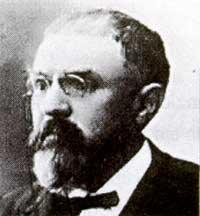Poincaré, Henri
(1854-1912)
Henri Poincaré entered the French city of Nancy in 1854. For many it would be the last mathematician who has dared to give a complete explanation of mathematics, since it is difficult to find a field that Poincaré did not touch.

As a young man he did not stand out at all. She had vision and psychomotor problems and many considered her delayed. However, it was of great memory, which allowed him to study. In 1879 he earned his doctorate in mining engineering. He joined teaching and taught mathematical analysis at the University of Caen. He was holder of the chairs of physical mechanics, mathematical physics, probability calculation and celestial mechanics for many years at the University of the Sorbonne. At the age of thirty-three he was appointed a member of the Academy of Sciences and two years later he became part of the French Academy.
Poincaré's goal was to put mathematics at the service of science. He considered it a duty and during his life he could not draw the thread from the investigation.
He discovered a special series of analytical functions and called them "fuchsia", they are analogous to elliptical functions, but Poincaré thought they served to integrate more operations. In addition, he worked a lot in agricultural functions, integral abelinas and double integral.
He studied differential equations and applied them in mathematical physics and celestial mechanics.
In 1911 Irakaspenak on cosmological hypotheses collected knowledge about the origin and creation of the universe until then. As mentioned above, it focused on issues of elasticity, heat transmission, kinetic gas theory, electricity or optics, and Einstein, newly created relativity theory, began to investigate about it.
Therefore, he worked very hard and therefore, half, he received many awards in France and outside France.
Henry Poincaré died in Paris in 1912.
Buletina
Bidali zure helbide elektronikoa eta jaso asteroko buletina zure sarrera-ontzian











